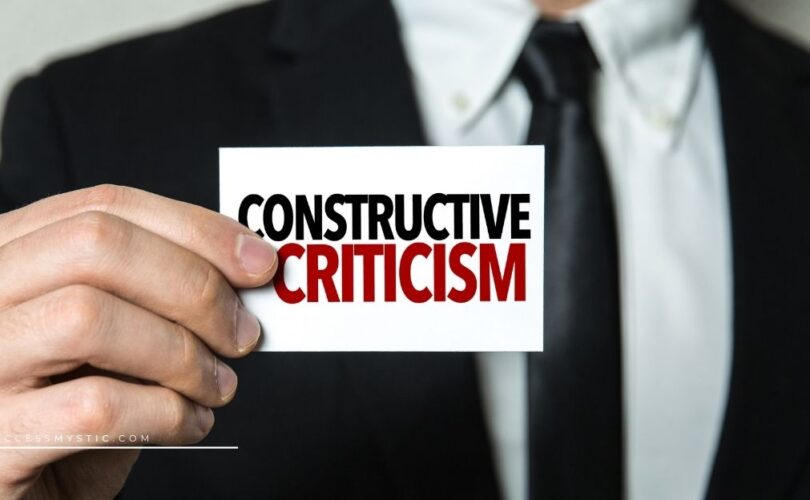No matter what you do or how well you perform, you will eventually receive criticism. It’s probably going to sting. In fact, professionally speaking it might be one of the worst moments of your career.
No one enjoys hearing negative things, even if they are accurate. The majority of people would prefer to avoid all of the awkwardness that comes with being told improvement is required. It’s not easy to be the person delivering the criticism either.
When you avoid conversations like this, though, you are losing out. It’s a fundamental life skill, receiving and giving constructive criticism and offering advice. If it’s given correctly, the awkwardness and pain of the experience could potentially be avoided. Feedback, constructive criticism should be a valued opportunity.
Let’s explore how to handle critical feedback and use it to your advantage.
The Truth About Criticism
It’s difficult to believe you’re wrong, especially when the news comes from the mouth of someone else. There’s a reason for this, and it’s psychological. Your brain wants to protect you so, it will go out of its way to make you feel like you’re right, even if you’re wrong.
This shouldn’t come as a surprise. In the 1970s, Stanford researchers held a study that showed people can be immune to facts ref. The researchers selected a group of students, splitting them into two groups. One group was pro-capital punishment, and the other against.
The groups were provided with the results of two studies, one showing the data supporting capital punishment and the other study providing facts against capital punishment. Both groups remained passionate about their original position and that is confirmation bias in action. Essentially, that is what your brain is doing for you, protecting you from the information that tells you you’re wrong.
You see, criticism is a threat to what we believe is our standing in social and work circles. It could impact how others see us. That feels like a threat to our survival. So, it makes perfect sense that we immediately feel defensive when someone attempts to offer criticism, even if it from a good place.
There’s something else about criticism and it’s an important fact. We remember it deeply, but often inaccurately. When we receive information that directly conflicts with our image of self, the instinct we have is to alter the information, instead of changing ourselves. Criticism often feels like it’s coming from nowhere because we don’t always keep track of our mistakes.
So, we have difficulty forgetting criticism, yet we equally struggle with remembering that criticism correctly. The negative aspects of the feedback tend to become magnified and more detailed, while everything else fades into the background. This is negativity bias, where your brain gives more weight to all of your bad experiences instead of the positive ones. So, criticism will always impact you more than praise. [ref.]
However, it’s important that we move beyond that because constructive criticism is valuable, and in the workplace, it facilitates growth and learning. Sadly, because of our impulse to defend ourselves, the majority of people don’t understand just how valuable a resource constructive criticism can be. It’s something that can help every one of us succeed, in life and in the workplace. There are a number of benefits to taking criticism on the chin.
- Constructive criticism increases your perspective and insight. How can this be? Well, when someone sits you down to provide you with a bit of criticism, it allows you to see something from an entirely new perspective. It might be that you never considered a particular point of view or that you have overlooked something. The biggest issue is that you take criticism personally, and in reality, it’s something that should help you grow.
- Constructive criticism creates bonds. You may feel as though it does the complete opposite. However, when you receive criticism it’s most likely because people want you to succeed. It means they’re invested in you and your future and want to see you get to where they believe you belong. If they didn’t provide you with feedback, you could fail and then they’d just replace you. When you receive criticism, think of it as your boss telling you they value you and want you on their team. They believe that with a bit of guidance, you will only get better.
- Constructive criticism cultivates trust. When you work in an environment where everyone is free to offer constructive criticism and feedback, everyone comes out a winner. It creates transparency and it creates a collaborative environment. Everyone has the opportunity to improve. We are all able to learn and create bonds of trust. This type of environment fuels productivity and pro-activeness.
7 Ways To Take Constructive Criticism Like A Champ
It feels as though the people who handle criticism amiably aren’t phased in the least. They just naturally possess the ability to take it and walk away better for it. You wish that you could deal with it as well as they have, but instead, you focus on all of those negatives.
You keep throwing that pity party and instead of dealing with the criticism, you push it away while letting it make you feel terrible. It’s time to forget the excuses and learn how to cope with criticism.
Let’s be honest, frank criticism hurts and there are very few people on this planet that can sit there and take it without feeling at least a little sting. That’s why we have the following tips for you on how to handle criticism.
1| Recognize the Value
It’s difficult to control your emotions when you are on the receiving end of criticism. You may feel anger or confusion, which leads to mounting an aggressive defense. That isn’t going to help you in your bid for success. You really do have to get over it. If the criticism you are being handed is constructive, then it’s important for you to remember they are offering it to you because they care. They’re not trying to hurt you. There is value in the criticism they offer, you just need to recognize that.
2| Take it Slow
Do not panic when you experience criticism. Allow yourself the time you need to calm down and process the feedback. No reaction is better than an overreaction so, don’t force yourself to put a smile on your face or even speak immediately. Silence shows you care as you aren’t interrupting the person offering you criticism.
3| Be Grateful
It’s a bit difficult to imagine yourself being grateful for criticism, but you have to consider the benefits. It’s going to help you improve relationships, gain new skills and grow existing ones, and ultimately, it will help you further yourself and get closer to your goals.
4| Interaction
Okay, by this point in the critical situation you have managed to avoid (or stop) the panic, you have regained control of your emotions and quietly reminded yourself there is benefit in criticism. Now, it’s time to embark on the interaction. First, it’s important to be open-minded. If someone is sharing their thoughts with you, there is a reason for it. Their insight will help your progress and performance. Let them speak without interrupting.
When they have finished speaking their peace, they will likely want to hear your thoughts. This is your opportunity to show that you respect their opinion. So, repeat their request back to ensure that you understood it correctly. This moment isn’t about analyzing the request or even critiquing it. It’s simply about ensuring you heard correctly.
5| Do Ask Questions
Questions are good, but that doesn’t mean a debate. In order to avoid misunderstandings, you need to absorb the feedback properly. So, your boss may have told you they love your vision, but your arguments aren’t persuasive enough. In this situation, an appropriate question in response would be to ask whether it was one particular point you struggled to communicate clearly or the entire idea. You can use this moment to admit your weaknesses, such as poorly expressing ideas when excited, and also be open to any advice they have to offer.
6| Offer Thanks
It’s difficult to imagine saying thank you when someone has just criticized you, but it’s necessary. Once you have completed the conversation, look them in the eye and thank them for the feedback they gave you. It should be thoughtful and deliberate. Understand, it didn’t mean that you agree with all of their comments, what it does mean, and show is that you respect their opinion.
7| Show Engagement
If the criticism was clear and you have a handle on the situation, then you can thank them and move on. However, if you discussed a larger issue, then you may need to request a follow-up meeting. This will be to gather ideas and track your progress. If you request this, it shows you won’t hide from a problem and you want to solve it – you’re a team player.
Making Criticism Work To Your Advantage
We have repeatedly referenced the term constructive criticism. What we’d like to make clear at this time is that whether it is constructive or not is entirely up to you. If you take the criticism and learn something from it, then it’s constructive. If you choose to use it as a baton with which to beat yourself over the head, then it’s isn’t.
Either way, it is you that has decided whether the criticism is constructive or not. Additionally, it’s up to you to extract the points from criticism which are valid and that you can apply to your life. Some people have to learn that the hard way, but now it’s time to harness it and use it to your advantage.
1| Centered Self-Awareness
When you have the self-awareness to remain centered even when your emotions are swirling wildly, then you remain centered. That’s 2what centered really is, and you are rooted firmly when your posture is upright, and you are open to others. When you achieve both of these things, you can hear criticism without jumping into defensiveness.
2| Hear And Question
You can’t harness the power of criticism unless you hear it properly and understand what is being communicated to you. It’s easy to lose focus when someone is criticizing you, but it is so important that you remain present and hear what they are saying.
Listen for nuance and repeat back what you believe you have heard. When you do this, the other person has an opportunity to clarify points. You can ask for details, if necessary. The point is that you understand the criticism clearly so that you can take appropriate action.
3| Consider the Source
While it’s up to you to determine whether the criticism is constructive, it’s important that you consider the source. There are people who just enjoy putting people down. These people tend to offer criticism that reflects their own insecurities.
The term projection came about for a reason, and many people are guilty of pointing the finger at others when it’s really their issue. You don’t know what they’re thinking, but you can consider the source. By doing this, you can determine whether the criticism is warranted. Even people who love to tear others down may have valid points.
4| Define the Relevance
Is this criticism valid and does it reflect an area of your game that requires work? Or, is it based solely in the rules that critic has set out? Is the critic an important person, does their opinion matter to you? Is this criticism essential and is it something that should be addressed?
5| Determine the Lesson
Based on everything above, you need to decide what specific lesson to take from the criticism. If it’s valid, you can gain a new perspective that will assist you in improving your performance. If it’s not valid, you can still use it.
It’s an opportunity to gain insight into the person who criticized you in the first place. It may be that the criticism is valid but trivial or irrelevant. That is a lesson in and of itself, it suggests that the critic is a time bandit that should be avoided as much as possible.
6| Decide How To Act
Valid criticism typically requires corrective action. For example, an important client makes a complaint about a consistent issue. You have to address that issue. Now, it might be that there is nothing to do because it’s an issue that, while valid, cannot be corrected. That’s still a decision on how to act. It’s all a decision, and it’s up to you to determine how you will act on the criticism that was offered to you.
7| Follow Up When Necessary
When you choose to act on criticism and the critic is something you have an ongoing relationship with, you may want to report back. The idea here is that you go through all of the steps above and then make your commitment to a specific change. You don’t need to follow up if you aren’t taking action or if you’ve decided specific points are unimportant or irrelevant. However, the follow up lets your critic know you are committed to growth.
Final Thoughts
Criticism isn’t your enemy, it’s the key to unlocking your self-improvement goals. How can you improve and work on your flaws if you aren’t aware of what they are? So, as natural as a hostile reaction feels, it’s important that you accept that criticism graciously. It might not be easy to take in those initial moments, however, it’s helpful and it’s going to be of great service to you in the long run.
It’s important that you recognize the good intentions when someone offers you criticism. This will help you become better at handling criticism. It will sting, of course, but the majority of people who offer constructive criticism don’t do it to hurt you. They do it because they care, they do it to help you become better at what you do. Think about that, rather than secretly seething about what they’ve said to you.
It’s vital that you listen actively while someone is offering you feedback. It’s easy to zone out, especially when it starts with words like great start, but… You heard the start and then your eyes glazed over, and you delved into obsession over the but, but you didn’t actually hear what came next. You can’t utilize criticism if you didn’t actually hear the criticism. It’s important to stay engaged, listen to their points, and tweak your work as necessary.
Additionally, it’s easy to feel confused about what is being said when you’re trying to cope with criticism. So, one of the most important aspects of the situation is that you summarize the feedback to ensure that you heard everything and interpreted it correctly. So, when it’s your turn to speak, it’s your opportunity to summarize and clarify the message. From there, you can roll up your sleeves, and put everything into action.
Everyone has an opinion and while you sometimes wish they’d keep it to themselves, they won’t. Even as time goes by and you put all of the steps provided into action, it will hurt. It doesn’t matter how thick your skin is, negative opinions, even if valid or with good intentions, hurt.
You might be the best of the best in your role, and you have always been one of the most efficient people in the office. Yet, one criticism can throw you entirely off track and make you wonder where it all went wrong. Anger, confusion, and frustration are all entirely normal. You can’t run away from criticism.
You have to deal with it head on, and here are some quick tips for how you can deal with communication and cope with criticism.
- Be clear and clearly state your intentions from the outset.
- When a task makes you feel uncomfortable, practice it more.
- If you offend someone you should apologize even if that wasn’t your intention.
- Make note of the areas of your work that were not criticized.
- Don’t defend yourself publicly, no matter how great the urge is.
- Be honest about the preparation that went into your project.
- Ask for help.
- Write out a plan on how you plan to do it next time.
- Try again.
- Focus on helping, not on anger.
- Take a deep breath.
This isn’t about beating the critics. In most cases, criticism isn’t about the critics. It’s all about you! It’s how you feel when things go wrong, and someone points it out. It’s about how you can motivate yourself to keep going even after making a mistake and having that brought up. It’s easy to do the things people agree with, it’s difficult to continue the preparation and practice cycle every day until you finally nail it.
However, the best way to silence critics is to beat yourself. It helps to frame criticism as helpful feedback and remember that it’s just another obstacle that you need to overcome. Beat back the frustration, overcome fear and pain, and remember why you do what you do.
It’s so important that you remember that criticism generally comes from a place of goodness. That is ultimately the key to every tip and hint provided above. The hardest thing about hearing and taking criticism is how it feels like a personal attack. It is rarely a personal attack, you shouldn’t take it to heart, but you should listen and take action when you realize the criticism is valid.
While not every criticism will be valid, you should be open and honest enough with yourself to recognize the difference between a true constructive critique and someone who is simply trying to undermine you. Dismiss all criticism at your peril.







